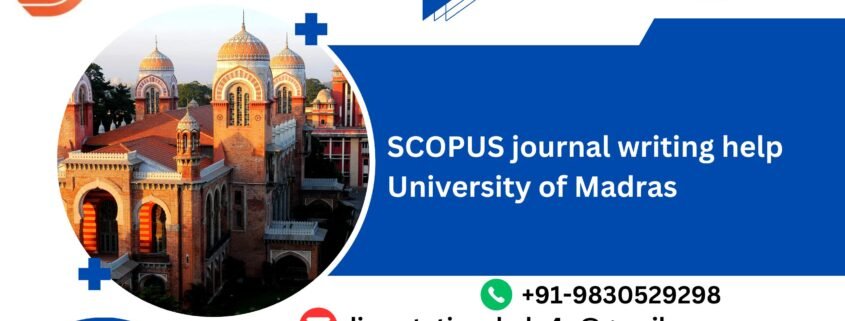SCOPUS journal writing help University of Madras
SCOPUS journal-writing help University-of-Madras
SCOPUS journal writing help University of Madras. Are you a scholar affiliated with the University of Madras aiming to publish your research in SCOPUS-indexed journals? Congratulations on your academic pursuit! However, navigating the intricate landscape of journal writing, especially for reputable platforms like SCOPUS, can be daunting. But fret not, as we’re here to provide you with comprehensive guidance to streamline your journal-writing process and enhance your chances of publication success. Let’s read our blog “SCOPUS journal-writing help University-of-Madras“.
Understanding SCOPUS:
Before delving into the nuances of journal writing, it’s crucial to grasp the significance of SCOPUS. SCOPUS is a vast database of peer-reviewed literature and an indispensable tool for researchers worldwide. Journals indexed in SCOPUS are esteemed for their quality and rigor, making them highly desirable outlets for scholarly dissemination.
Crafting Your Manuscript:
Now that you comprehend the importance of SCOPUS, let’s delve into crafting your manuscript. Begin by carefully reviewing the author guidelines of your target journal. These guidelines elucidate specific formatting requirements, citation styles, and submission procedures essential for adherence.
Structuring Your Paper:
A well-structured paper is pivotal for conveying your research findings effectively. Typically, SCOPUS journals adhere to a standardized structure comprising sections such as Introduction, Literature Review, Methodology, Results, Discussion, and Conclusion. Ensure each section flows seamlessly, providing a coherent narrative of your study.
Writing Style and Language:
Maintaining a clear and concise writing style is imperative for engaging readers and facilitating comprehension. Avoid jargon and convoluted language, opting instead for clarity and precision. Additionally, adhere to the designated word count and employ appropriate terminology relevant to your field of study.
Incorporating Citations:
Citations play a crucial role in bolstering the credibility of your research and situating it within the broader scholarly discourse. Familiarize yourself with the preferred citation style of your target journal, whether it be APA, MLA, Chicago, or another format, and meticulously cite all sources used in your manuscript.
Seeking Peer Feedback:
Before submitting your manuscript to a SCOPUS journal, solicit feedback from peers and colleagues. Peer review offers invaluable insights into areas for improvement, ensuring your paper undergoes rigorous scrutiny prior to submission.
Finalizing and Submitting:
Once you’ve incorporated feedback and revised your manuscript accordingly, it’s time to finalize and submit your paper to the SCOPUS journal. Pay meticulous attention to detail, ensuring all formatting guidelines are met, and double-check for any grammatical or typographical errors.
Conclusion: SCOPUS journal-writing help University-of-Madras
In conclusion, mastering the art of SCOPUS journal writing is a multifaceted endeavor requiring meticulous attention to detail and adherence to scholarly conventions. By following the guidelines outlined above, University of Madras scholars can significantly enhance their prospects of publishing in prestigious SCOPUS-indexed journals, contributing meaningfully to their respective fields of study.
Thank you for read our blog “SCOPUS journal-writing help University-of-Madras”. I hope this blog is helpful to you, if you have any question feel free Call / WhatsApp: +91 9830529298 || Email: dissertationshelp4u@gmail.com.
Also read our more BLOG here.
#SCOPUSJournal, #JournalWriting, #AcademicWriting, #ResearchHelp, #UniversityOfMadras, #AcademicSupport, #ResearchPublication, #HigherEducation, #UniversityLife, #AcademicSuccess, #ResearchGoals, #StudyTips, #AcademicCommunity, #ScholarlyWriting, #PublishingResearch
















Leave a Reply
Want to join the discussion?Feel free to contribute!